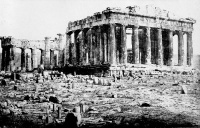Cultural critic
From The Art and Popular Culture Encyclopedia

|
"What is the good of criticism?" --Charles Baudelaire |

|
Related e |
|
Featured: |
A cultural critic is a critic of a given culture, usually as a whole. Cultural criticism has significant overlap with social and cultural theory. While such criticism is simply part of the self-consciousness of the culture, the social positions of the critics and the medium they use vary widely. The conceptual and political grounding of criticism also changes over time.
Contents |
Terminology
A cultural critic therefore stands, in relation to intellectual or artistic life, or certain social arrangements or educational practices, roughly where a prophet would in respect of religious life. Cultural criticism is normally understood to deal with some fundamental perceived problems, rather than minor improvements: it is asserted that things are heading in the wrong direction, or that values are wrongly placed. These terms may, however, be used in a more diffuse way.
The term cultural criticism itself has been claimed by Jacques Barzun: No such thing was recognized or in favour when we [i.e. Barzun and Trilling] began — more by intuition than design — in the autumn of 1934. In contrast, a work such as Richard Wolin's 1995 The Terms of Cultural Criticism: The Frankfurt School, Existentialism, Poststructuralism (1995) uses it as a broad-brush description. Contemporary usage has tended to include all types of criticism directed at culture.
Victorian sages as critics
Cultural critics came to the scene in the nineteenth century. Matthew Arnold (his much-cited Culture and Anarchy was subtitled An Essay in Political and Social Criticism) and Thomas Carlyle are leading examples of a cultural critic of the Victorian age; in Arnold there is also a concern for religion. John Ruskin was another. Because of an equation made between ugliness of material surroundings and an impoverished life, aesthetes and others might be considered implicitly to be engaging in cultural criticism, but the actual articulation is what makes a critic. In France, Charles Baudelaire was a cultural critic, as was Søren Kierkegaard in Denmark and Friedrich Nietzsche in Germany.
Twentieth century
In the twentieth century Irving Babbitt on the right, and Walter Benjamin on the left, might be considered major cultural critics. The field of play has changed considerably, in that the humanities have broadened to include cultural studies of all kinds. A cultural critic might still be distinguished by being firmly judgmental, rather than concentrating on the role of objective scholar.
See also
- Criticism of multiculturalism
- Cultural pessimism
- Culture theory
- Semiotics of culture
- Social criticism

